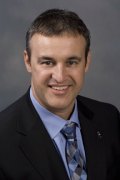Palmer Chancellor Marchiori Applauds Wisconsin's Push to Expand Scope

Marchiori stopped short of recommending prescriptive rights asserting that a primary care role did not require it.
Referring to Palmer's past three years researching and carefully crafting an identity for chiropractors as: "The primary care professionals for spinal health and well-being." Marchiori stated ". . . we need an identity, a focus and a scope of care that honors our tradition, is evidence-based — and is clearly understood and embraced by health care consumers.
The release of the press release follows closely on the heels of other letters released by chiropractic college presidents in support and against Wisconsin's efforts to expand the scope into primary care and drugs.
Stiefel asserts the “necessity for the chiropractic profession to shed old, unsupported ideologies and embrace current evidence and current research as the foundation for professional progress.”
Brimhall asserted in his letter to the WCA that those institutions choosing to “restrict” their educational offerings by not including drugs do so based on “dogmatic precepts and/or philosophical tenets” and that such actions “interfere with the needs of patients”.
Edwin Cordero DC, in a press release on the issue stated:
Cordero also drew a clear distinction in his letter that Sherman trains its graduates as Portal of Entry Providers stating:
"Sherman College of Chiropractic holds the position that the practice of chiropractic remains a service separate and distinct from other healing arts. Its unique clinical objective is to locate, analyze and correct vertebral subluxations. Building on this, Sherman College teaches courses to prepare its graduates to practice as portal-of-entry providers in all 50 states and around the world. Sherman College graduates are competent and trained to meet all requirements for licensure and safe application of the unique service of chiropractors."
Many chiropractors confuse primay care with portal of entry and make the mistaken assumption that one must be primary care in order to see someone without a referral.
While the Fountainhead is not endrosing drugs and surgery, many in the profession believe that drugs are a red herring and the the real issue is the push by the Chiropractic Cartel into Primary Care. In fact, every chiropractic college in the United states asserts that it trains its graduate to be primary care providers since this is a requirement for accreditation by the Council on Chiropractic Education. Stating you are a primary care provider for the spine allows schools and states to hide behind an imaginary designation that exists only in their minds.
This was after the CCE removed “without drugs and surgery” from the definition of chiropractic in the accreditation standards. The language of avoidance of “unnecessary drugs” was placed in as a compromise and ostensibly to allow the introduction of drugs into chiropractic while still maintaining compliance with the CCE Standards because, unlike medical doctors, chiropractors would only ever prescribe drugs that are necessary.
While chiropractic programs such as National University and Western States that are pushing for expansion into the practice of medicine have seen a steady decline in enrollment according to IPEDS data from 2010 through 2013 schools like Sherman that embrace a vitalistic, subluxation centered model have seen their enrollments increase during the same time.
The efforts to expand chiropractic scope of practice and include drugs and other procedures that are the practice of medicine are believed to be a response by schools such as national and Western to increase their declining enrollments and to increase practitioners' ability to generate additional income. Nevertheless they frame it as expanding primary care access to those in need.
Blogs
- The Chiropractic Cartel: A Look Back at Bias in Accreditation and its Imact on Today's Profession
- Inside Montana's Chiropractic Monopoly: ACA & MCA's Brazen Board Takeover
- Concerns Grow About Control of the NY State Chiropractic Board by the ACA - Use of X-ray in NY Under Threat
- Reproductive Health Information and Chiropractic Care: Navigating New Privacy Regulations
- Navigating Substance Use Disorder (SUD) Consent: What Chiropractors Need to Know














